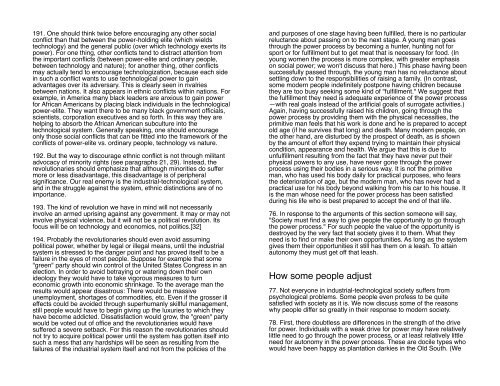Unabomber Manifesto - ouroboros ponderosa
Unabomber Manifesto - ouroboros ponderosa
Unabomber Manifesto - ouroboros ponderosa
Create successful ePaper yourself
Turn your PDF publications into a flip-book with our unique Google optimized e-Paper software.
191. One should think twice before encouraging any other socialconflict than that between the power-holding elite (which wieldstechnology) and the general public (over which technology exerts itspower). For one thing, other conflicts tend to distract attention fromthe important conflicts (between power-elite and ordinary people,between technology and nature); for another thing, other conflictsmay actually tend to encourage technologization, because each sidein such a conflict wants to use technological power to gainadvantages over its adversary. This is clearly seen in rivalriesbetween nations. It also appears in ethnic conflicts within nations. Forexample, in America many black leaders are anxious to gain powerfor African Americans by placing black individuals in the technologicalpower-elite. They want there to be many black government officials,scientists, corporation executives and so forth. In this way they arehelping to absorb the African American subculture into thetechnological system. Generally speaking, one should encourageonly those social conflicts that can be fitted into the framework of theconflicts of power-elite vs. ordinary people, technology vs nature.192. But the way to discourage ethnic conflict is not through militantadvocacy of minority rights (see paragraphs 21, 29). Instead, therevolutionaries should emphasize that although minorities do suffermore or less disadvantage, this disadvantage is of peripheralsignificance. Our real enemy is the industrial-technological system,and in the struggle against the system, ethnic distinctions are of noimportance.193. The kind of revolution we have in mind will not necessarilyinvolve an armed uprising against any government. It may or may notinvolve physical violence, but it will not be a political revolution. Itsfocus will be on technology and economics, not politics.[32]194. Probably the revolutionaries should even avoid assumingpolitical power, whether by legal or illegal means, until the industrialsystem is stressed to the danger point and has proved itself to be afailure in the eyes of most people. Suppose for example that some"green" party should win control of the United States Congress in anelection. In order to avoid betraying or watering down their ownideology they would have to take vigorous measures to turneconomic growth into economic shrinkage. To the average man theresults would appear disastrous: There would be massiveunemployment, shortages of commodities, etc. Even if the grosser illeffects could be avoided through superhumanly skillful management,still people would have to begin giving up the luxuries to which theyhave become addicted. Dissatisfaction would grow, the "green" partywould be voted out of office and the revolutionaries would havesuffered a severe setback. For this reason the revolutionaries shouldnot try to acquire political power until the system has gotten itself intosuch a mess that any hardships will be seen as resulting from thefailures of the industrial system itself and not from the policies of theand purposes of one stage having been fulfilled, there is no particularreluctance about passing on to the next stage. A young man goesthrough the power process by becoming a hunter, hunting not forsport or for fulfillment but to get meat that is necessary for food. (Inyoung women the process is more complex, with greater emphasison social power; we won't discuss that here.) This phase having beensuccessfully passed through, the young man has no reluctance aboutsettling down to the responsibilities of raising a family. (In contrast,some modern people indefinitely postpone having children becausethey are too busy seeking some kind of "fulfillment." We suggest thatthe fulfillment they need is adequate experience of the power process—with real goals instead of the artificial goals of surrogate activities.)Again, having successfully raised his children, going through thepower process by providing them with the physical necessities, theprimitive man feels that his work is done and he is prepared to acceptold age (if he survives that long) and death. Many modern people, onthe other hand, are disturbed by the prospect of death, as is shownby the amount of effort they expend trying to maintain their physicalcondition, appearance and health. We argue that this is due tounfulfillment resulting from the fact that they have never put theirphysical powers to any use, have never gone through the powerprocess using their bodies in a serious way. It is not the primitiveman, who has used his body daily for practical purposes, who fearsthe deterioration of age, but the modern man, who has never had apractical use for his body beyond walking from his car to his house. Itis the man whose need for the power process has been satisfiedduring his life who is best prepared to accept the end of that life.76. In response to the arguments of this section someone will say,"Society must find a way to give people the opportunity to go throughthe power process." For such people the value of the opportunity isdestroyed by the very fact that society gives it to them. What theyneed is to find or make their own opportunities. As long as the systemgives them their opportunities it still has them on a leash. To attainautonomy they must get off that leash.How some people adjust77. Not everyone in industrial-technological society suffers frompsychological problems. Some people even profess to be quitesatisfied with society as it is. We now discuss some of the reasonswhy people differ so greatly in their response to modern society.78. First, there doubtless are differences in the strength of the drivefor power. Individuals with a weak drive for power may have relativelylittle need to go through the power process, or at least relatively littleneed for autonomy in the power process. These are docile types whowould have been happy as plantation darkies in the Old South. (We






